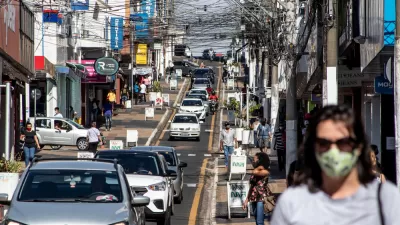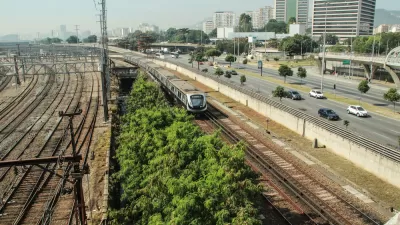Futile efforts to deal with rampant urbanization could fetter the region's robust economy and squander its potential to become a global economic powerhouse, according to the McKinsey Global Institute (MGI).
In a 60-page report titled "Building globally competitive cities: The key to Latin America growth," MGI argues that the region's largest cities are so "congested, poorly planned and dangerous" that "their institutional, social and environmental support structures have not kept up with their expanding populations."
The Economist weighs in, stressing the importance of establishing good planning practices in this emerging part of the world:
"Compared with their peers in developed countries, Latin America's top ten cities are unsafe, suffer endemic housing shortages, poor schooling and weak health services. They are also inefficient in their energy use and waste management."
"Unplanned sprawl leads to a shortage of green space, strains transport systems, and makes it hard for businesses or housing developers to find sites. All this is harder still when cities expand beyond their political boundaries, creating problems of co-ordination (Mexico City is split between the Federal District and the surrounding State of Mexico, for example). [...] Along with land use, transport is the biggest headache facing city authorities. Vehicle ownership is likely to expand by 4% a year over the next 15 years, further clogging the streets."
FULL STORY: City limits

Alabama: Trump Terminates Settlements for Black Communities Harmed By Raw Sewage
Trump deemed the landmark civil rights agreement “illegal DEI and environmental justice policy.”

Study: Maui’s Plan to Convert Vacation Rentals to Long-Term Housing Could Cause Nearly $1 Billion Economic Loss
The plan would reduce visitor accommodation by 25% resulting in 1,900 jobs lost.

Why Should We Subsidize Public Transportation?
Many public transit agencies face financial stress due to rising costs, declining fare revenue, and declining subsidies. Transit advocates must provide a strong business case for increasing public transit funding.

Paris Bike Boom Leads to Steep Drop in Air Pollution
The French city’s air quality has improved dramatically in the past 20 years, coinciding with a growth in cycling.

Why Housing Costs More to Build in California Than in Texas
Hard costs like labor and materials combined with ‘soft’ costs such as permitting make building in the San Francisco Bay Area almost three times as costly as in Texas cities.

San Diego County Sees a Rise in Urban Coyotes
San Diego County experiences a rise in urban coyotes, as sightings become prevalent throughout its urban neighbourhoods and surrounding areas.
Urban Design for Planners 1: Software Tools
This six-course series explores essential urban design concepts using open source software and equips planners with the tools they need to participate fully in the urban design process.
Planning for Universal Design
Learn the tools for implementing Universal Design in planning regulations.
Smith Gee Studio
Alamo Area Metropolitan Planning Organization
City of Santa Clarita
Institute for Housing and Urban Development Studies (IHS)
City of Grandview
Harvard GSD Executive Education
Toledo-Lucas County Plan Commissions
Salt Lake City
NYU Wagner Graduate School of Public Service




























